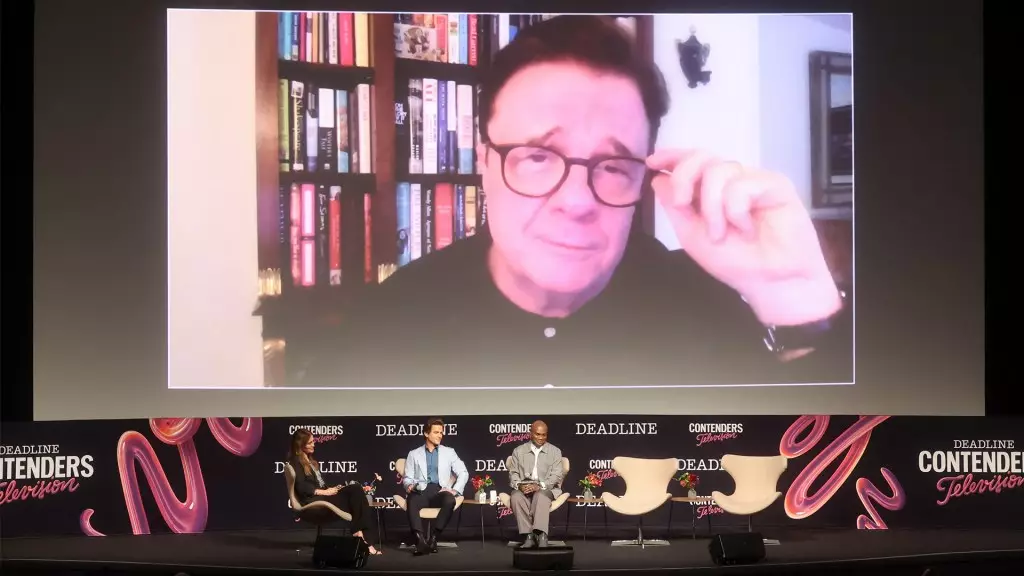In a time when the political atmosphere seems increasingly oppressive for LGBTQ+ individuals, the arrival of the multi-camera sitcom “Mid-Century Modern” is a breath of fresh air. Celebrated by its cast—Nathan Lane, Matt Bomer, and Nathan Lee Graham—the show emerges not just as entertainment, but as a poignant response to the current societal landscape. “We’re all aware of the hostility that permeates the atmosphere,” Lane remarked during a recent panel discussion, encapsulating the urgency for authentic representation in media. Given that many LGBTQ+ rights are under siege, this sitcom offers an antidote, intertwining humor with heartfelt narratives that resonate deeply within the community.
Joy Amidst Adversity
The premise of “Mid-Century Modern” centers on three older gay men who rekindle their lives in Palm Springs following the death of a close friend. With Lane portraying Bunny, the bra magnate, alongside Jerry (Bomer) and Arthur (Graham), the narrative is more than just comedic escapades; it’s a touching exploration of love, loss, and the importance of found families. This trio embodies the spirited resilience and vulnerability of LGBTQ+ individuals, showcasing that joy and laughter can thrive, even in challenging circumstances. Bomer poignantly noted the series offers “a little queer joy,” accentuating the need for positive narratives that uplift marginalized voices.
The Importance of Authentic Storytelling
With an accomplished lineup of creators, including Ryan Murphy and the minds behind “Will & Grace,” the show promises genuine storytelling that transcends mere stereotypes. Lane’s acknowledgment of the setting—particularly in light of current political strife—encourages viewers to see beyond mere entertainment value. The show holds a mirror to society, reflecting LGBTQ+ experiences that are often overlooked. In an industry where representation is paramount, “Mid-Century Modern” reminds audiences that comedy can be a powerful tool for social change, allowing viewers to engage with themes of acceptance and community in a nuanced way.
Unforgettable Contributions: A Tribute to Linda Lavin
The production faced an emotional upheaval with the passing of Linda Lavin, who played Bunny’s mother, Sybil. Her tragic loss not only affected the cast but shaped the narrative itself, leading to a heartfelt tribute in episode nine, “Here’s to You, Mrs. Schneiderman.” The ethical commitment from the creators to honor her legacy speaks volumes about the show’s heart and integrity. She leaves behind a legacy of grace, one that Bomer reflected upon fondly, highlighting how Lavin’s presence infused the show with warmth and wisdom. Such moments of acknowledgment in storytelling highlight the richness that older characters bring to the gay narrative, showcasing the depth of LGBTQ+ experiences across generations.
Countering Misconceptions with Live Audiences
In an age where the authenticity of laughter can be questioned due to the prevalence of laugh tracks, Graham made a spirited defense of their live audience recordings. His assertion that the laughter comes from genuine reactions serves as a reminder that the show’s humor is not manufactured; rather, it is a shared experience between the cast and their audience. This dynamic not only strengthens the bond between viewers and characters but also underscores the collaborative spirit that defines “Mid-Century Modern.” By eliminating artificiality, the show creates a space where real emotional connections thrive, reinforcing the idea that laughter is a communal act that transcends individual experiences.
Finding Laughter as a Form of Resistance
Ultimately, “Mid-Century Modern” stands as a robust beacon of hope in volatile times. It couples the timeless themes of friendship and support with a distinctively queer lens, offering a sharp contrast to the often harrowing realities facing LGBTQ+ individuals today. As the stars themselves have articulated, the show’s vibrant energy challenges societal norms and stirs conversations around issues of representation and acceptance. Amidst adversity, the creators and cast have woven a narrative that not only entertains but also empowers, establishing that, in the face of struggle, joy remains a potent form of resistance.

